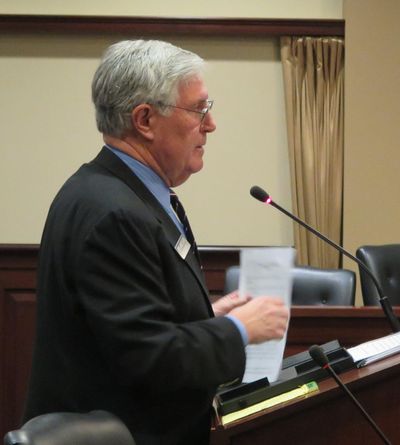Idaho resolution says porn is creating ‘public health crisis’

Pornography is “creating a public health crisis,” according to a resolution introduced by an Idaho House committee on Tuesday.
“Families are torn apart because of the proliferation of this material,” Rep. Lance Clow, R-Twin Falls, told the House State Affairs Committee. “Our communities, state and nation are being harmed at an epidemic rate.”
The committee agreed to introduce Clow’s resolution, and also a bill he proposed to direct public libraries in Idaho to expand their internet filtering to cover not only the computers they offer for public use, but also their WiFi services.
“The fear was … some people might be able to get access through WiFi,” Clow said, “that they might not be able to get by just walking up and using the library computer.”
Idaho lawmakers in 2011 ordered libraries to develop policies regarding pornography and filter their internet access to block it. They’re already required to do that under the terms of federal e-Rate funding they receive to fund internet access.
Clow said he checked with an expert in the field who assured him “that the inclusion of WiFi should be a relatively easy change – that most filtering equipment right now has the capability of doing both.”
“Probably most libraries, especially the larger ones, are already in compliance,” Clow said.
The resolution won the committee’s whole-hearted support. Panel members, led by Rep. Christy Zito, R-Hammett, added to the language, to make clear that women, men and children can be adversely affected by pornography.
Peer-reviewed research on pornography has shown that excessive use of it can harm romantic relationships, according to the American Psychological Association. But not all research on porn has found negative effects. A 2013 study published in the Journal of Sex Research, for instance, showed that use of porn by women was associated with improved sexual quality.
Clow said he modeled the resolution on one from Utah.
It discusses adverse impacts of pornography, including youth development and attitudes, promotion of violence and objectification.
“Using pornography can negatively impact brain development and functioning, contribute to emotional and medical illnesses and lead to difficulty in forming or maintaining intimate relationships, as well as create harmful sexual behaviors and addiction,” the resolution says. It also says that pornography is “linked to a reduced desire in young men to marry, dissatisfaction in marriage, and infidelity.” The committee added the words, “and young women.”
The resolution calls for recognizing the need for education, prevention, research and policy change to combat the use of pornography, and also encourages “all state agencies, local governments and Idaho political subdivisions” to take steps to ensure that pornographic materials can’t be accessed through their internet connections.
The committee’s unanimous vote to introduce both the bill and the resolution clears the way for full hearings on both measures.
Clow said some citizens approached him about the issue, and some other legislators talked to him about it. He noted that the Legislature passed a non-binding memorial to Congress along the same lines in 2008.